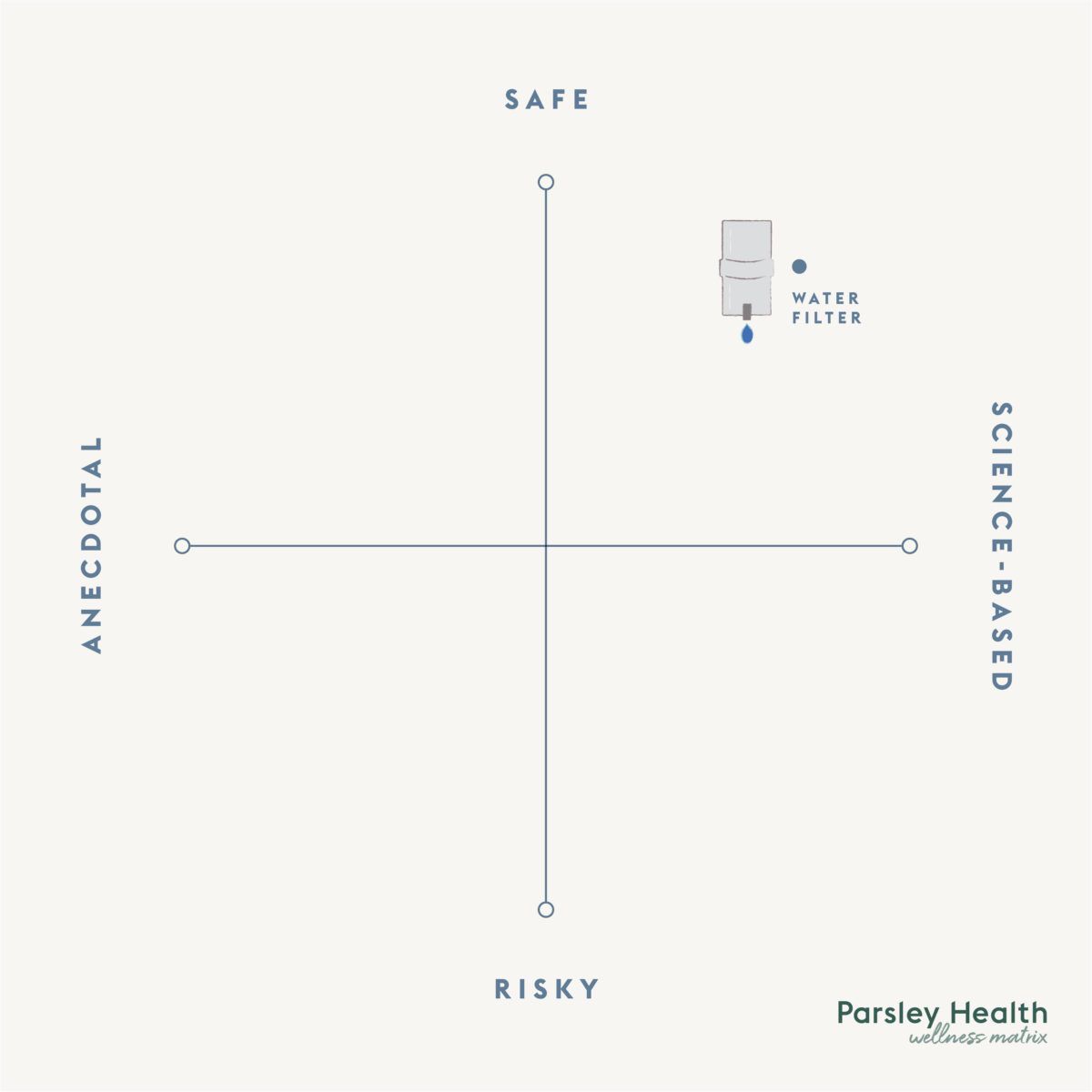Everyone can benefit from a water filter, according to Lilli Link, MD a board-certified internist and functional medicine practitioner at Parsley Health New York. Though there’s recently been much publicity about water contamination in cities like Flint, Michigan or Chicago, Illinois where lead has seeped into the water system and caused serious long-term damage to the health of many residents, the fact remains that even seemingly “clean” sources of water contain substances that could be harmful to your wellbeing, she adds.
All water contains a wide array of substances that range in impact on the human body. Some—like lead—can pose serious health risks. Others are far less threatening, especially in small quantities. But here in the United States, water generally goes through a significant filtration process before it winds up coming out of the faucet for us to drink.

How is your water filtered before it reaches your sink?
Local municipalities are responsible for tap water filtering (assuming it doesn’t come from a well, which is generally believed to be safe to drink due to the ground’s natural filtration abilities). During this process, Dr. Link explains, most dirt, dust, heavy metals and microbes are removed. Then, most municipalities add chlorine which kills off even more harmful microbes but also adds a chemical to your water source.
Next, the water travels through the city’s piping system to be delivered to sinks in places like homes, office buildings, public water fountains and restaurants. Here’s where things can go wrong. Water can actually pick up contaminants such as lead and copper during this process, depending on the material used to build the pipes, their age, and their maintenance. So it’s possible that you and your neighbor, who get the same local water, could actually end up with completely different contaminants in your water based on your pipes.
Am I at risk of lead poisoning?
Lead is likely the most dangerous substance in terms of health risks. Research after Flint’s water crisis showed it could lead to irreversible intellectual and behavioral issues in children as well as heart and kidney disease in adults. Dr. Link adds that lead can also cause neurological problems and hypertension.
If you’re a pregnant woman, it’s especially important you use a water filter, Dr. Link says.
“We know that babies are born with hundreds of chemicals in their systems. By drinking filtered water, the mom is decreasing this exposure to her baby,” she says.
Chicago, for example, mandated the use of lead until 1986, when it was banned by federal law. Those pipes continue to exist today and the city has required residents to pay for their replacement. What’s more, frequent construction across the city actually rattles the old service lines, releasing lead particles into the water flowing through them. A Chicago Tribune analysis in 2018 showed around 70 percent of homes had some lead in their water, and the Environmental Protection Agency (EPA) has publicly stated there’s no such thing as “safe” lead exposure.
Other cities have faced similar crises. Newark, New Jersey; Pittsburg, Pennsylvania; and Providence, Rhode Island, for example, have all been flagged as “actionable” by the EPA.
The scale of lead exposure in the United States—the Natural Resources Defense Council estimated about 5.5 million people nationally drank water from concerningly contaminated sources between 2015 and 2018—validates Dr. Link’s point that a water filter can serve everyone.
The risks of going without a water filter
Dr. Link adds that it’s not just lead you should be concerned about. Fluoride and chlorine can cause extra toxins in the body which stresses the systems responsible for removing those substances, she says.
According to Dr. Link, fluoride can weaken the enamel of developing teeth in kids, weaken your bones, and possibly interfere with thyroid function.
As for chlorine, preliminary research shows that this could mess with our good gut bacteria. However, Dr. Link notes that this is a theoretical concern, though an important one.
Is your water safe to drink?
To get a clear picture of what your home drinking water looks like, it’s worth having your water tested whether you get city or well water. Water testing kits can be purchased online, or in some cases, provided for free upon request, like in New York City. You can also check the local drinking water quality through the EPA’s Consumer Confidence Reports.
Knowing what’s in your water can help you make a decision about the best water filter for your needs.
What kind of water filter should I use?
So do you really need to spend 300 dollars on something like the much talked about Berkey water filter? Not necessarily. You’ll want to look at different filtering methods and products to determine what’s best for you. Reverse osmosis filters, for instance, are “particularly effective at removing all these contaminants, better than most other kinds of filters,” Dr. Link says. This process uses pressure to force water molecules through a “semipermeable” membrane that pushes out particles of contaminants.
Critics say that this type of filter wastes a lot of water and that they’re over-effective, Dr. Link says, meaning they take out healthy minerals like calcium. However, she calls this a “theoretical concern” because most of our mineral consumption comes through food anyway.
While you could use a pitcher water filter like a Brita, which is smaller, cheaper at the outset and increasingly effective, Dr. Link says you’ll have to “change the filter more frequently, making it more expensive per gallon in the long run.”
Whatever your financial constraints, though, Dr. Link says it’s important that you find a filter that will remove all contaminants from your water.
If you need help narrowing down your search, NSF, a public health and safety organization that independently tests and certifies water filters, has a site that lets you search for NSF certified water treatment units and filters.
“It shouldn’t matter what contaminants are more prevalent in your water system,” she says. There are other options that use the reverse osmosis systems and haven’t been hyped up like the Berkey water filter (which uses a combination of filtering processes) and, therefore, they’re considerably more affordable.
Finally, be prepared to never want to drink tap water once you make the switch to purified water, Dr. Link foreshadowed. “You won’t want to drink tap water anymore because your taste buds will be able to taste the chlorine. And you probably won’t want to drink bottled water either because it is bad for the environment…and the plastic taste that leaches into the water,” she says.

